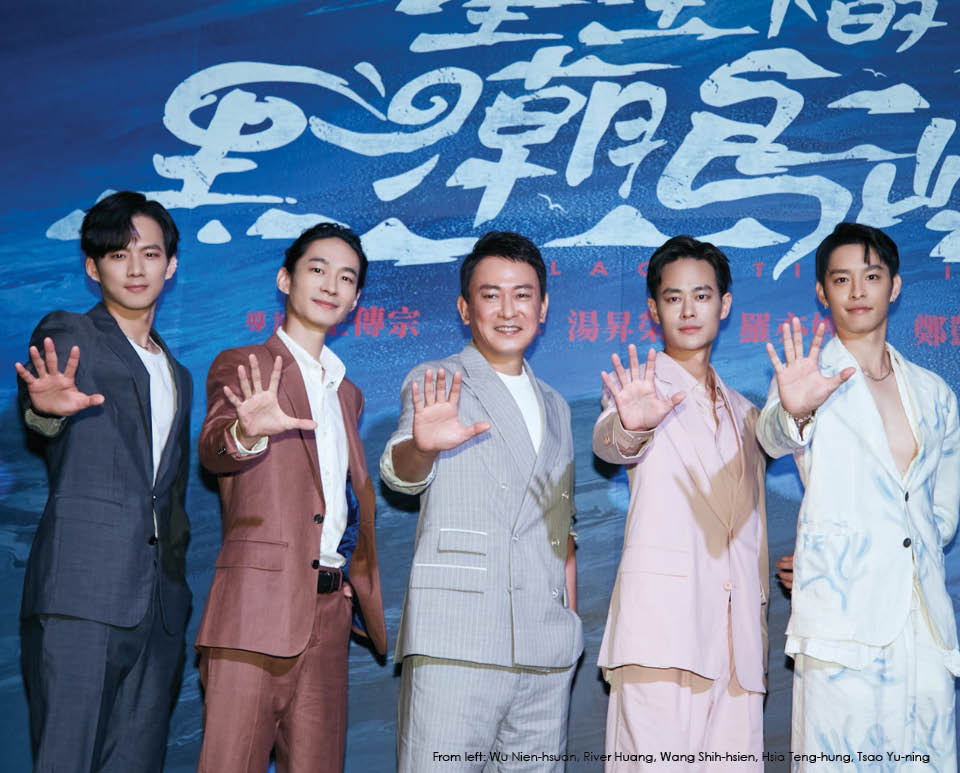
In 1950, as the Korean War raged, martial law was imposed in Taiwan and the forces of democracy battled communism, political prisoners from different backgrounds were incarcerated on Taiwan’s notorious Green Island.
"Black Tide Island", a nine-episode drama directed by Golden Bell award-winner Jim Wang, is based on the medical professionals among them, who, with limited facilities and against all odds, set up a small surgery.
Against the backdrop of what has come to be called Taiwan’s era of “white terror”, these men went on to save lives, bring hope in desperate circumstances and, despite their differences, forge life-long bonds.
"Black Tide Island" stars Wu Nien-hsuan as Qiu Yong-gui, a tenacious college graduate from a Hakka village. River Huang is Luo You-de, a knowledgeable but social-phobic and arrogant Hakka physician, with Tsao Yu-ning as talented but directionless mixed-race Hakka/Hoklo artist, Liu Chaoqin.
Hsia Teng-hung plays Li Mu-xiong, a seemingly brave war doctor with his own trauma, and Wang Shih-hsien is Hoklo Taiwanese physician Zhong Fu-yuan.
Production on the nine-episode period drama, which has been in development since 2018, kicked off in Tainan this month and is scheduled to run until December.
The series, produced by Hakka TV & Roger Cheng for Go Inside, will be distributed internationally, Cheng says.
Created from scratch from a story uncovered by director Wang and Cheng, Black Tide Island involves multiple languages and dialects, including Hakka and Japanese.
“We thought it’s so unbelievably amazing that how these real prisoners managed to bring hope to people while being so desperate and hopeless in prison. They even self-made violins and formed a band while in jail. They have a saying “If you don’t kill time, time will kill you!,” Cheng says.
“Prisoners were from many different backgrounds,” he adds, outlining what turned out to be the production’s biggest challenge – languages. Actors speak Hakka, Taiwanese, Japane...
In 1950, as the Korean War raged, martial law was imposed in Taiwan and the forces of democracy battled communism, political prisoners from different backgrounds were incarcerated on Taiwan’s notorious Green Island.
"Black Tide Island", a nine-episode drama directed by Golden Bell award-winner Jim Wang, is based on the medical professionals among them, who, with limited facilities and against all odds, set up a small surgery.
Against the backdrop of what has come to be called Taiwan’s era of “white terror”, these men went on to save lives, bring hope in desperate circumstances and, despite their differences, forge life-long bonds.
"Black Tide Island" stars Wu Nien-hsuan as Qiu Yong-gui, a tenacious college graduate from a Hakka village. River Huang is Luo You-de, a knowledgeable but social-phobic and arrogant Hakka physician, with Tsao Yu-ning as talented but directionless mixed-race Hakka/Hoklo artist, Liu Chaoqin.
Hsia Teng-hung plays Li Mu-xiong, a seemingly brave war doctor with his own trauma, and Wang Shih-hsien is Hoklo Taiwanese physician Zhong Fu-yuan.
Production on the nine-episode period drama, which has been in development since 2018, kicked off in Tainan this month and is scheduled to run until December.
The series, produced by Hakka TV & Roger Cheng for Go Inside, will be distributed internationally, Cheng says.
Created from scratch from a story uncovered by director Wang and Cheng, Black Tide Island involves multiple languages and dialects, including Hakka and Japanese.
“We thought it’s so unbelievably amazing that how these real prisoners managed to bring hope to people while being so desperate and hopeless in prison. They even self-made violins and formed a band while in jail. They have a saying “If you don’t kill time, time will kill you!,” Cheng says.
“Prisoners were from many different backgrounds,” he adds, outlining what turned out to be the production’s biggest challenge – languages. Actors speak Hakka, Taiwanese, Japanese and Mandarin (Taiwan was under Japanese rule during 1895-1945).
Tainan was chosen for the shoot because of the government-backed film studio for period drama, which received partial funding from Taiwan’s Ministry of Culture.
Hakka TV backed the series as part of its original drama mandate. While some of the characters are of Hakka origin, the show is targeted at a much wider audience, Cheng says.





























